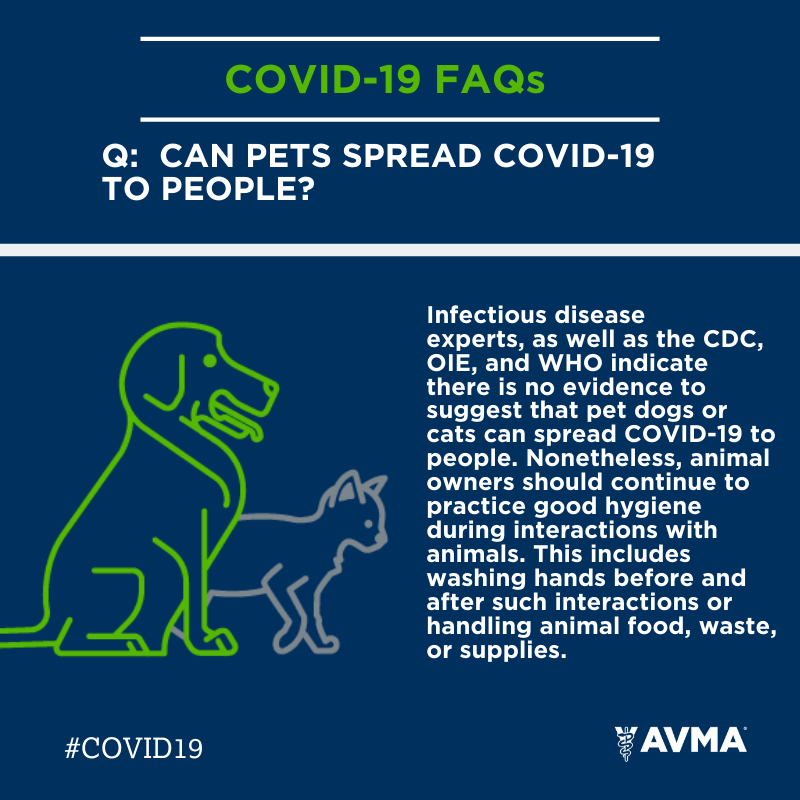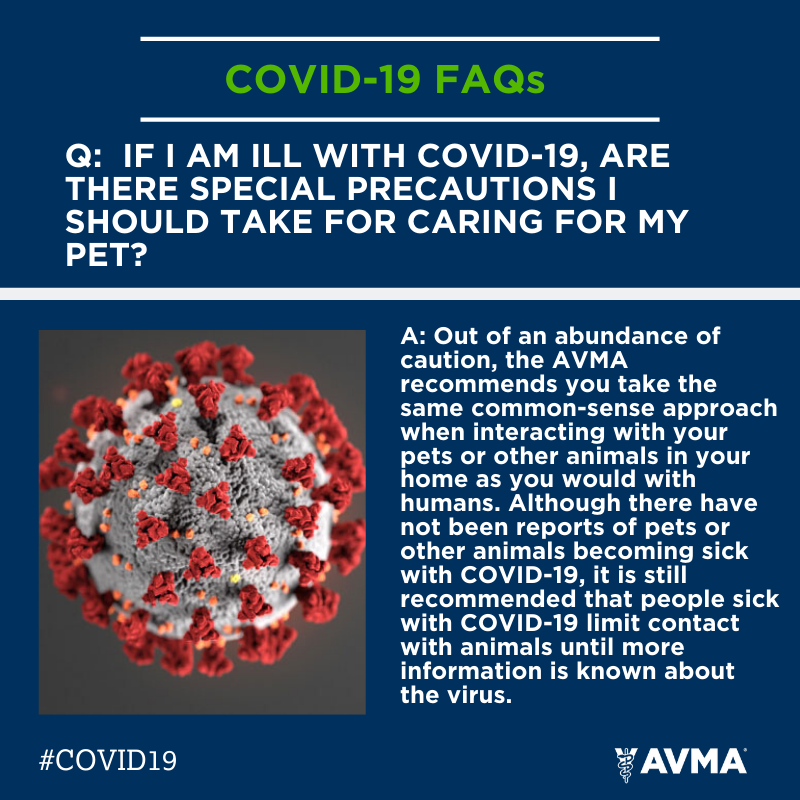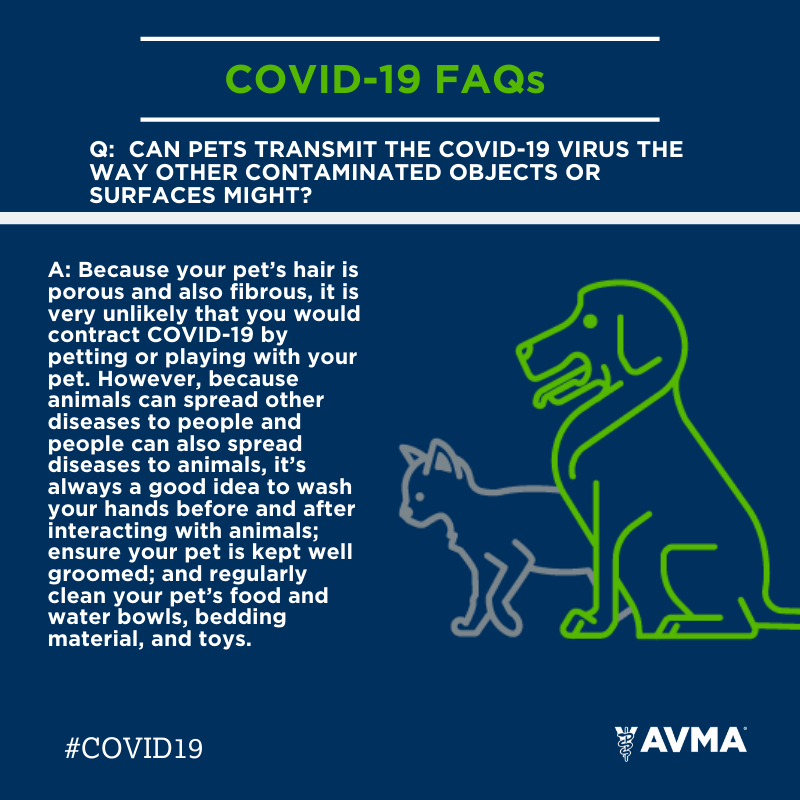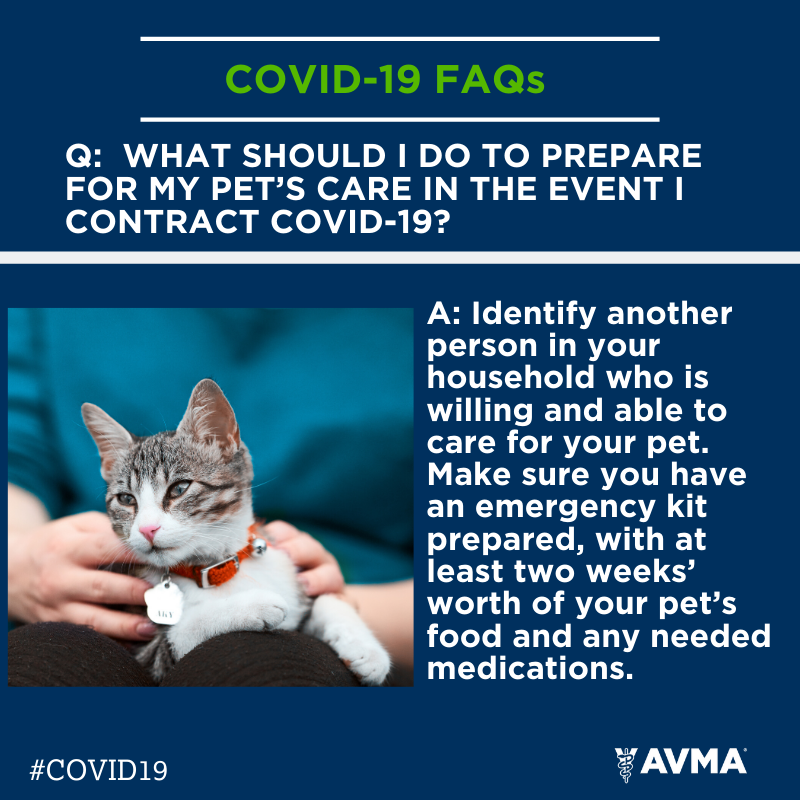|
These are certainly stressful times and many of you are also worried about COVID-19 and your pets. Let us help answer your questions.
Click the link below to read an article on this topic. I have also posted some slides with great information; used with permission from the American Veterinary Medical Association (AVMA). February is National Dental Health Month!
Periodontal disease is defined as an inflammatory disease affecting the structures that support the teeth (i.e. gums and bone). Did you know most dogs and cats have some evidence of periodontal disease by 3 years of age? Dental Health is one of the most commonly missed components of optimum pet health care because it is about more than just bad breath. When bacteria laden plaque and calculus get below the gum line, it causes damage to the structures supporting the tooth. Left unchecked, the result is eventual loss of the teeth. Tooth loss is not a normal aging change for pets! What does periodontal disease mean for your pet?
The good news is we can help!
What concerns can wait until tomorrow and what needs to be addressed right away? Here are some general guidelines for you:
1) Loss of Consciousness. Is your pet responding to you? If you call his/her name do they look at and interact with you? No? EMERGENCY! 2) Bleeding…still bleeding? Bleeding or blood loss that won’t stop? Come in ASAP!!! 3) Pain! A sudden onset of pain or weakness (crying, yelping, not walking/moving normally) is an emergency. Certain injuries are very time sensitive and irreversible if you wait. 4) Severe vomiting or diarrhea. This can accelerate quickly into more problems. Intestinal blockages and certain types of intestinal upset can be life-threatening. 5) Seizure that doesn’t stop or repeated seizures. This can cause overheating and permanent organ damage. 6) Can’t pee!!! If your pet cannot successfully urinate but keeps straining to go, they need to be seen today! You pet may have a blocked urethra which can cause bladder rupture, kidney failure, heart disturbances, and death! Don’t assume they just have a urinary tract infection. 7) Respiratory distress. Your pet may appear anxious, restless and worried. You may note one or more of the following signs: abdominal effort to breathe, exaggerated chest movements, open-mouth breathing, pale or bluish gum color, foaming at the mouth, coughing, collapse. This is an emergency! 8) Medication/toxin ingestion. If your pet ate your medication, another pet’s medication, an overdose of their own meds, rat bait, snail bait, chocolate, xylitol, or anything else they should not have eaten, please call us right away. If your pet arrives within an hour of ingestion, we have a much better chance of reducing the damage that toxin can cause to your pet. 9) Trauma. Dog fights, attempted abduction by large bird of prey/coyote, falls, accidents are some examples of trauma. Not all injuries are evident right away. Some take time to develop. Let us check out your pet right away to reduce potential complications. 10) Abnormal temperature. Being too hot or too cold indicates something is wrong. Normal rectal temperature is between 100.0 to 102.5 degrees Fahrenheit but most of us have a feel for our pet’s normal. If you are concerned your pet is not a normal temp, bring them right away. 11) This is not an all-inclusive list! If you are concerned, call! We will be happy to get your pet in for a thorough examination!  Pack your bags. Pack your car. Pack your sleigh. But don’t let your pet pack on the holiday pounds! Schedule your pet’s yearly checkup today. Holiday season is upon us — a busy time of year for festivities, family and of course, lots of eating! Did you know that if a ten-pound cat ate just one ounce of cheddar cheese from your hors d’oeuvres, it would be the same as if a person ate three and a half hamburgers or four chocolate bars? Gaining those “holiday pounds” is not just a problem for humans, but also for our four-legged friends. Research shows that pets are more likely to gain unwanted pounds during this holiday period than any other time of year. What pet can resist a potato chip, onion dip or chocolate? (Wait, you know better than to feed them that!) Obesity is the leading medical problem in pets. When a pet is too chubby, not only may they have little energy to walk or play, but also studies have shown that pets who are overweight may have a shortened life span. How can you tell if your pet is at the right weight? It can be hard to know because for many pets, they don’t get a big round belly. Instead, the extra fat is well hidden inside your pet’s body, tucked between their vital organs. So let us check! Our veterinary practice team has a trained eye to best assess your pet’s weight. Bring your pet in for their yearly exam and we’ll take a look at their body condition and nutritional needs. If we determine your pet needs to lose a few pounds, don’t worry. We’ll come up with a plan that will keep you and your pet sailing through the holiday season. Call us today to schedule your pet’s yearly checkup. Happy holidays and remember, pack your suitcase. Pack a trunk. It’s even fine to pack a sleigh. But don’t let your pet pack on the pounds!  Schedule your pet’s annual checkup today to be sure your pet is healthy! It’s summer! Time for BBQs, long hikes and refreshing water play! You and your pet enjoy this time of year. It’s filled with activity, fun and food! There are a few things we have to talk about. First, is your pet eating the right food for their lifestyle? Meeting your pet’s nutritional needs is vital to their health and happiness. So before you take your big hike with Fido or start your movie marathon on the couch with Fluffy, bring in your furry friend for their annual exam. Second, if your pet is just 10% over their ideal body weight (that may mean 1 lb. for a 10 lb. cat), they are at risk for developing serious medical conditions. Who wants that for their buddy? No way, you say! Come in for a checkup and a pit stop at the scale! Third, most “people” food is not good for pets, especially from the grill! For example, feeding your pet chicken bones can cause tooth fractures and tear up their digestive tract during digestion. Make an appointment for your pet’s annual checkup today – we’ll give them a thorough physical exam from nose to tail! And we’ll talk about what they’re eating and if we have to make any changes. Who loves your pet besides you? Us! Book your pet’s yearly exam today so we can keep your pet healthy and happy this summer! We recommend a fecal test every 6 months. What are we testing for and why do we seem so interested in your pet's poop? Well, we are looking for worm eggs and other microscopic parasites (hookworm, roundworm, whipworm, and coccidia to name a few). Most worms live attached to the intestinal lining and intermittently release microscopic eggs. So just becuase you don't "see" worms in your pet's stool doesn't mean they aren't there! Most importantly, there are parasites that people can get from their pets (hookworms and roundworms). We check the poo to ensure your cat or dog doesn't have intestinal parasites and to protect your family members from them as well. We also highly recommend giving your pet a monthly parasite control medication like Trifexis. It controls fleas, prevents heartworm AND deworms every month from common intestinal parasites.
October is a great month for animals!
It’s National Service Dog Month, National Animal Safety and Protection Month, ASPCA’s Adopt a Shelter Dog Month and there’s even a shout-out to cats this month on National Cat Day, October 29. With all of these warm and fuzzy feelings circulating in the autumn air, it’s a perfect time to take a good, hard look at your pet. How has he/she been acting lately? Nipping. Scratching. Litter box issues. Leash pulling. Meowing at night. Urinating on the floor. Chewing shoes. Are these behaviors just part of being a “normal” dog or cat, or not? Some common behavior issues are due to underlying medical problems. These illnesses are tough to recognize even for the most observant owners. For example, if your dog started nipping at the kids, it may be a sign he’s in pain. Your cat may stop jumping on your lap. Not because she’s being unfriendly, but because she has arthritis and it hurts. If these behaviors are left unchecked, it’s a triple issue. The behavior may worsen, the underlying medical condition may progress (which puts your pet’s health at risk), and most importantly, your pet’s quality of life as part of your family is compromised. Here’s where we can help. We have the expertise when it comes to analyzing, identifying and resolving behavior issues with your pet. At your pet’s yearly checkup, we can talk about your pet’s behavior and help give your pet a “new leash” on life! We are committed to your pet’s well-being…all the way! Schedule your pet’s yearly checkup today.  Question: Is your pet at risk for any of the following: A) Fleas B) Ticks C) Worms D) All of the above Answer: All of the above (and they ALL can be tough to spot!) Schedule your pet’s annual checkup today to be sure your pet is healthy! Is your dog very tired? Is your cat eating less than usual? These seemingly minor changes may mean your pet has a flea allergy, an internal parasite infection, or a tick-related disease. Let’s talk about fleas first. The majority of pets don’t have fleas—but many have been bitten because fleas are everywhere! Yes, fleas live outdoors but they can live indoors too – even in really clean homes – year-round in any climate. Fleas will gladly hitch a ride on your pet into your house. And all it takes is one flea bite (specifically the flea's saliva), to set off a full blown skin allergy. Pets may scratch their sides, neck or even lick their paws until they’re red and painful. What pet wants to move around or eat when feeling this miserable? Internal parasites (such as worms) can infect your pet in a number of ways. Sometimes, it’s hard to know if your pet has them. But left untreated, worms can be dangerous to your pet’s internal organs. They can even cause your pet to lose blood. Ticks are tricky. Even when you check your pet for ticks they can be tough to find because they’re small and hide well in dark fur. But it’s crucial to find ticks and remove them quickly. Why? Some ticks carry bacteria that cause disease (such as Lyme disease, but there are many others). And all you need is one undetected tick bite for your pet to become infected. They can become sick and develop kidney problems. At times, these diseases can be fatal. Ugh! Is there any good news? Yes! We’re experts when it comes to flea allergies, tick and internal parasite checks. Even if your pet is on regular monthly preventive, it is still important for us to make sure your pet is healthy. Make an appointment for your pet’s annual checkup today – we’ll give them a thorough physical exam from nose to tail. Let’s also confirm the prevention you’re using is right for your pet!  Keep your pet moving and grooving this summer Schedule their yearly checkup today! Musculoskeletal diseases (conditions that involve bones, muscles and joints) can affect pets of all ages. They can have aches and pains like we do. But sometimes these diseases are hard to spot. Think about your furry friend for a moment… Have they stopped jumping on you when they greet you at the door? Have they stopped perching on the window sill? Is your pet acting “old?” These changes in activity may be due to weather, age or good training. However, to guarantee your pet is at their best, we have to rule out they don’t have a hidden musculoskeletal problem. Infections, hormonal imbalances, nutrition, blood disorders and arthritis can all affect your pet’s activity—the way they play, move, eat and cuddle! The good news is we have ways to prevent, cure or manage these conditions, so your pet can continue to have a good quality of life. We are committed to the wellbeing of your pet for their lifetime. The best way to do this is to book your pet’s yearly checkup today. Make an appointment and together, we’ll keep your pet’s bones, muscles and joints (and the rest of your furry friend) in good working order!  Did you know that dogs and cats who become overweight are predisposed to diseases and health issues just like humans?? It is true. Dogs and cats that carry a few or a lot more pounds than they should have organs that work harder. Heart disease, diabetes and back or joint issues are just a few of the health concerns that arise from being overweight or obese. It is important that you give your pet the chance to be healthy his whole life through. Many of our pets are overweight without their owners even realizing it. Dr. Miles and Dr. Agahi can examine your pet to determine his healthiest weight for a healthy lifestyle. If your pet does need to lose, both our doctors take pride in providing an effective weight management program. As humans we feel our best when we are active and eat healthy foods. The same goes for our cats and dogs. Allow us to help you help them and if you have ideas on healthy, active lifestyles. Share them with us. We are a team after all!! |
The 411Check out our blog page periodically for educational information on pet care, safety tips and more! Archives
March 2020
Categories |
Office HoursMonday - Friday: 7:00am - 6:00pm
Saturday: 7:00am - 2:00pm Sunday: CLOSED |
Location17859 Santiago Blvd. Suite A
Villa Park, CA 92861-4114 714-998-4322 *Our clinic is located in the Villa Park Shopping Center. We are located behind Bank of America on the North/East side of the lot with Ralph's in the front and to the left." |
Site powered by Weebly. Managed by IDEXX Laboratories




 RSS Feed
RSS Feed
